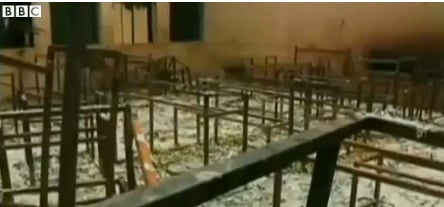
Two weeks ago, they were at school studying for a physics exam. Now, over 200 teenaged schoolgirls have been reportedly sold into sex slavery for just $12 at mass “weddings” across West Africa.
The girls were abducted in the middle of the night from their Nigerian boarding school on April 14, packed into lorries and spirited away to an unknown location deep in the nearby Sambisa forest on Nigeria’s border with Cameroon.
A lucky few escaped by jumping from the truck or running into the dense forest. But now, it’s reported the girls who remain missing — at least 180, although reported figures vary — have been forced to marry armed gunmen from the extremist Islamic terrorist group that abducted them.
Jihadist group Boko Haram, whose name means “Western education is forbidden” in the local Hausa language, wants to impose a stricter enforcement of Sharia law across Nigeria.
While the group has not publicly taken credit for the mass abduction, its leader Abubakar Shekau has previously admitted to small kidnapping attacks and chillingly announced last year that those abducted by the group would begin a new life as “servants”.
Girls previously kidnapped by the group have later been found, working on remote farms, pregnant or with babies as a result of rape.
Halite Aliyu of the Borno-Yobe People’s Forum told the Associated Press on Wednesday that the reports about the kidnapped schoolgirls’ “mass weddings” had come from villagers in the Sambisa Forest.
“The latest reports are that they have been taken across the borders, some to Cameroon and Chad,” Aliyu said.
Community elder Pogu Bitrus told the BBC that some of the kidnapped girls “have been married off to insurgents”. “(It’s) a medieval kind of slavery. You go and capture women and then sell them off,” Bitrus said.


Top Comments
We could only hope our leaders would take action to help save those unfortunate girls. But in this harsh reality, we all know deep down that people would start forgetting and soon enough it would be nothing more but old news and unsolved problems. As sad and completely harsh my words may be, this has been occurring constantly and repeatedly. My heart goes out to these innocent young girls and their families. They did not deserve this atrocious treatment, not a single one. Unless military intervention is involved, we could only hope and pray and convince ourselves that it would be enough to help. For the voices of the desperate are overpowered by those that seek to deafen us from those who cry. For no matter how many likes or tweets this news gets, good intentions would only be as good if and only if it was acted upon. I could only ask my God that justice be delivered in this world and he next for the crimes we as mere mortals could not easily forgive, if we could even forgive it at all.
We should be searching for & freeing these girls instead of searching for a plane at the bottom of the ocean!
Yeah. It's pretty unimagainable that there's not a more organised search effort for these poor girls, Sie. - Grace